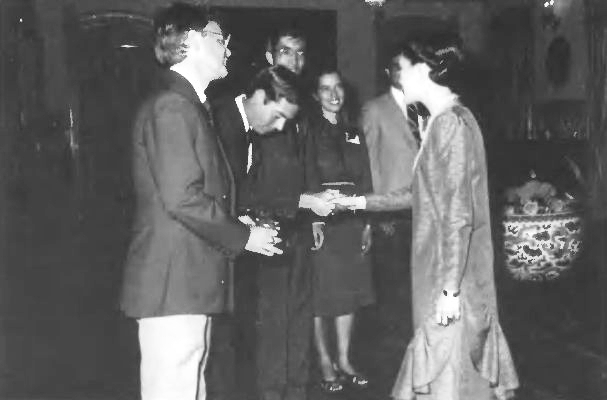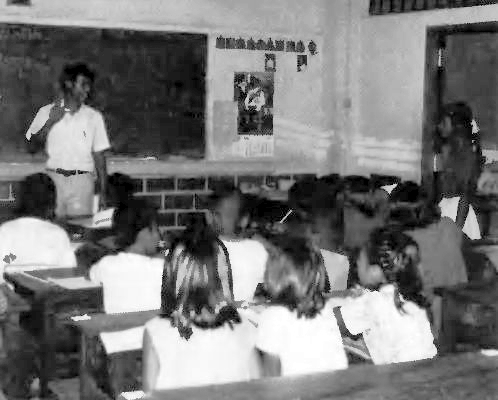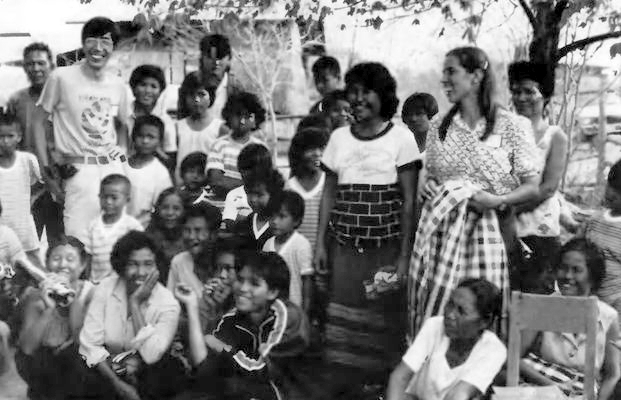![]()
The Words of the McLackand Family
|
|
The Words of the McLackand Family |

IRFF
representatives present Queen Sirikit of Thailand with a donation of
a lathe machine. Left to right: Jack Hart, Kem Mylar, Satoru Katsuda,
Ursula McLackland, Joe Rodolico, and the Queen.
Thailand has a population of about 60 million, and five million people live in the capital city of Bangkok. Bangkok is quite developed and absolutely cosmopolitan, but the rest of the country is very poor. The next largest city has only 100,000 people, and everywhere else there are only villages and rice farms. In Bangkok, shopping centers are built at a faster rate than in America, and both the Thai people and the tourists there like to spend their money rather lavishly, no matter what the political situation is. In the country, however, the people have only rice to eat, with little opportunity to spend at all.
The population is almost entirely Buddhist -- 96 percent. Muslims make up only about one percent. There are also very few Christians -- one to two percent -- but recently young people seem to have become more interested in Christianity. Many of them take Bible study courses by correspondence.
The climate is tropical. Technically, there are three seasons -- a very hot summer, a six-month monsoon season, and a "winter," which is still very warm. To a visitor, it just looks as if it's either raining or not raining.
Since 1975, the International Relief Friendship Foundation (IRFF; formerly WRFF) has been continually involved in Thailand. Our most successful work has been done through our refugee camp medical team. Financial support for the team comes from the Rescue Committee for Indochinese Refugees located in Japan, and the staff comes from the Japanese Medical Academy for Peace. Lately our staff has consisted of between seven and ten Japanese: one doctor, a pharmacist, three nurses or midwives, a few medical technicians, and a driver. In terms of medical treatment and hygiene, IRFF is now responsible for all the Vietnamese boat people that enter Thailand. The medical team works full time.
In 1979, the government asked IRFF to take care medically of a small refugee camp of about 1,000 people called Sikhiu Camp. It was originally started in 1975 for the Vietnamese people who had escaped by land through Laos and Cambodia. It was a small camp compared to some of the others in Thailand.
After one or two years, however, more and more Vietnamese refugees began to arrive by boat. The Thai government was extremely cautious in its treatment of the Vietnamese boat people because of the threat of communist spying activity. The government pronounced that it would put the boat people together on islands or in isolated areas and restrict the refugees from access to all foreigners, even to the United Nations High Commissioner for Refugees (UNHCR). This created an uproar from the UNHCR and dozens of other foreign agencies working in Thailand. They protested about possible human rights violations. Yet the government remained secretive about its plan, refusing to let any of these agencies know where the islands or isolated areas would be.
At that time the Thai government contacted IRFF unofficially and told them that all the land people in Sikhiu Camp would be relocated to other countries, that the camp itself would be cut off like an island, and that 5,000 Vietnamese boat people would replace the previous refugees. The government knew our anti-communist stand and had come to trust us over the years. We agreed to take care of these 5,000 refugees in every way possible. Workers in other relief agencies learned of this and became very jealous, since they were not permitted to get into the camp without going through elaborate procedures. The UNHCR especially wanted to get their social workers in, but the Thai government did not allow it, knowing that social workers can move immediately into the living situations of refugees and secure connections to spies. The UNHCR has no control over its personnel, and many of them are indeed leftist. Yet the Thai government let our social worker come in, and our entire team was able to work effectively.
There were many educated people among the Vietnamese land refugees, including some very qualified doctors. At one time the medical team had as many as eight Vietnamese doctors helping the staff, and they received a small salary for their assistance. But as the land people got resettled, we lost most of our Vietnamese doctors. We were concerned at first about hiring an outsider, but the Bangladeshi doctor we found to help us turned out to be a very good worker. He and his wife are fine people. We had no problem getting him into the camp because of the trust the Thai government has in us.

IRFF
representative teaches math and English to children in Bangkok.
In 1980, IRFF representatives visited the Thai princess, who is also the vice president of the Thai Red Cross Society. To support the work of the Red Cross, IRFF presented her with a gift of three microscopes. Later, when IRFF expressed the desire to donate a Tong-11 lathe machine to the queen of Thailand, the queen granted us an audience. This was quite miraculous, because our gift was not costly and not directly related to her primary interest, which is handicrafts. Nevertheless, one afternoon we were called and informed that we were to meet the queen that evening.
King Bhumibol and Queen Sirikit are extraordinary examples of dedication to their people. They travel around the country for eight months of the year, speaking to the people and making plans to try to improve their economic situation. The Thai people love their king and queen very much, and no one says anything against them. The sacrificial devotion of the royal family to their country is one reason, I feel, that God can protect Thailand from communist invasion. We in IRFF also feel that by desperately trying our best to serve the people we are offering a condition to preserve Thailand's freedom.
There is certainly no logical reason why Thailand hasn't fallen yet. Even the Thai police wonder about it. Thailand is strategically important to all of Southeast Asia. It is feared that if Thailand becomes communist, Malaysia, Singapore, Indonesia, and the Philippines will also be lost. Thailand is the only existing hope for protection and liberation to those already suffering in the communist countries of Vietnam, Cambodia, and Laos. The preservation of this nation is essential to God, and its stability is really nothing short of a miracle.
When we went to the palace for our audience with the queen, we didn't know the formal procedure for presenting a gift. The five of us were told to line up in a row, but we saw that we were a great distance from the queen. We were confused, and Jack Hart, the IRFF representative who was to present the gift, didn't know if he should approach her. The queen must have sensed our bewilderment, because she came all the way across the room to us in a very natural, humble way.
Normally an audience with the queen is a highly official occasion; gifts are quickly offered with a bow. Yet Jack, who loves the royal family, began to testify before the queen in tears about how the royal family's concern and sacrifice for the country of Thailand moved his heart. He expressed to her how much he respected them and felt connected to them.
During this testimony and a brief discussion with the queen -- which lasted about twenty minutes altogether -- the queen stood very near to us. This is very rare. The queen is like a goddess to her people, and they would not even think of drawing near to her or touching her. But because Jack had spoken from his heart, she responded from her heart as well. When he mentioned the refugees, she asked, "How are they?" as if she were inquiring of her own children. We experienced a wonderful feeling of closeness to her, and she shook the hand of each of us, this was shown on the evening TV news. Before she left the room, after she had briefly received a gift from another group, she turned back to us and said, "I can't tell you how much you have cheered me up!"

Clothes
are distributed in the Makkasan slum area of Bangkok by IRFF
representatives.
The Thai people are generally very proud of not accepting Christianity; little has remained from the mostly temporary efforts of Christian service there. Thus we had to be strongly determined to show them our sincerity through our work.
In January 1981 we received $2,000 in funds and launched another medical team, this one to serve the poor people in the slums of Bangkok. We started it with the help of a Thai foundation. The director of this foundation is a good Christian who later became our friend. In the beginning a nurse from her foundation came to work with us, and later two social workers were added to the staff. Our clinic was open once a week, and the people came for medicine and advice.
The Japanese medical team would come down from the refugee camp to the city on weekends and help us, but later on the number of refugees in the camp increased so much that we could not rely on their help. We had to depend more and more on our own resources. Now we have our own Thai doctor.
We also taught adults how to cook foods which they could sell. Primarily we wanted to teach the people how to help themselves. Parents came to us with problems concerning their children's schooling. Since many of the children did not go to school and had nothing to do, we began some simple educational programs on basic hygiene and other things. In addition, we were able to begin a scholarship program for as many as sixty children. In every home in our neighborhood we took a survey, and where there was a need and where the parents responded, we pledged to support their children with scholarships until the children completed their education. In many cases we were able to get children legally registered for schooling who had not been able to register previously.
If the parents displayed apathy or irritation with our questions, the social worker would warn them that this was their only chance to get help, and that we would not come again. Later, when those parents saw the progress of the other children, they complained. We explained to them that they had failed to respond when they were given the chance. We worked this way in order to teach them the lesson that they had to invest themselves before they could receive help, and to encourage them to see the value of what we were trying to give them.
It was also important for us to learn that we should not just give endlessly, running after people, but that we had to require some condition of interest and cooperation from them first.
So far, IRFF has operated under a temporary registration as a foreign agency working in Thailand. It is our hope that within a year or so we will be permanently registered as a foundation, which has the right to work with any group of people in Thailand and raise its own funds. Until we are established as a foundation our work will be somewhat restricted in scope.
Once we become registered we will want to expand our medical services to many more poor areas in Bangkok. There are groups which already do social work in the slum areas, but few can afford to do medical work because it is so expensive to hire doctors and other medical personnel. We have the personnel, so we want to assist other foundations in this way.
The success we have created so far in Thailand, however, is really due to the unity of the IRFF representatives, their prayer, hard work, and disciplined lifestyle. We have met Thai people who are very serious in wanting to know God. They pray desperately and make tremendous efforts to find Him; it is exciting to watch them grow spiritually. When I am with two or three such people together, I can really feel the presence of God.